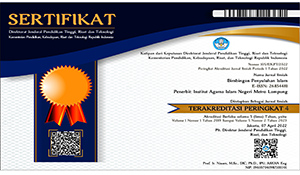STRENGTHENING TEENAGERS' AWARENESS ABOUT THE DANGERS OF DRUGS THROUGH ISLAMIC COUNSELING AT MADRASAH ALIYAH
DOI:
https://doi.org/10.32332/56ceqj18Keywords:
Adolescent Resilience, drug abuse, Islamic Counseling, Islamic Senior High School, Islamic ValuesAbstract
Drug abuse among adolescents represents an increasingly complex issue in Indonesia. It demonstrates alarming trends with serious implications for the future of the nation's younger generation. Drug prevention approaches through internalization of Islamic values become highly strategic and urgent to develop. This study aims to evaluate the effectiveness of Islamic-based counseling in enhancing adolescent resilience against drug use at MA Alhuda Pameungpeuk. Employing a mixed-methods design, the research integrates in-depth interviews, focus group discussions (FGDs), observations, and pre-test–post-test assessments using validated attitude measurement instruments. The results reveal that the internalization of Islamic values, particularly hifdz al-nafs (preservation of life) and hifdz al-ʿaql (preservation of intellect), significantly strengthens spiritual awareness, rejection attitudes, and adaptive behaviors. The discussion highlights the integration of spirituality and positive psychology frameworks in the context of drug abuse prevention through Islamic educational interventions. In conclusion, Islamic value internalization offers a promising approach in drug prevention efforts among madrasah adolescents.
References
Abdullah, M., & Ramli, S. (2021). Islamic education and youth development: Challenges and opportunities. Journal of Islamic Education, 15(2), 112–128.
Abdullah, N., & Jamaluddin, Z. (2021). Integrating Islamic values in school curriculum: Best practices from selected madrasahs. International Journal of Islamic Education, 9(1), 45–63.
Badri, M. (2019). Islam and modern psychology: Towards an Islamic cognitive behavioral therapy. International Journal of Islamic Thought, 16, 1–16.
BNN (Badan Narkotika Nasional). (2023). Survei prevalensi penyalahgunaan narkoba pada kelompok pelajar dan mahasiswa di 34 provinsi. Jakarta: BNN.
Catalano, R. F., & Hawkins, J. D. (2019). The social development model: A theory of antisocial behavior. In M. D. Krohn, N. Hendrix, G. P. Hall, & A. J. Lizotte (Ed.), The Cambridge handbook of violent behavior and aggression (2 ed., hal. 32–50). Cambridge University Press. https://doi.org/10.1017/9781316841113.003
Creswell, J., & Clark, P. (2011). Best Practices for Mixed Methods Research in the Health Sciences. Methods, 29, 1–39. https://doi.org/10.1002/cdq.12009.
Fishbein, M., Ajzen, I., Aqeel, M., Anjum, U., Asad, S., Baier, C. J., … Deci, E. L. (2021). Identity-based motivation. Journal of Religion and Health, 4(2), 152–154. https://doi.org/10.1521/978.14625/28806
Habibi, A., & Pratiwi, D. S. (2023). Transforming peer culture in drug prevention programs. Indonesian Journal of Educational Psychology, 12(2), 89–104.
Hamidah, F., Rusydi, A., Hanifah, M., & Zakariya, H. (2023). Spiritualitas dan resiliensi pelajar Muslim. Jurnal Pendidikan Islam, 17(1), 88–101.
Jennings, M., Parker, S., & Williams, T. (2023). Religious identity and substance use: A longitudinal study. Journal for the Scientific Study of Religion, 62(1), 145–164. https://doi.org/10.1111/jssr.12809
Koenig, H. G. (2018). Religion and mental health: Research and clinical applications. Academic Press. https://doi.org/10.1016/C2015-0-06044-3
Masten, A. S. (2014). Ordinary magic: Resilience in development. Guilford Press.
Organization, W. H. (2022). Global strategy on alcohol and drug prevention: 2022–2030.
Oyserman, D. (2017). Identity-based motivation. In A. J. Elliot (Ed.), Advances in motivation science (Vol. 4, hal. 135–186). Academic Press. https://doi.org/10.1016/bs.adms.2017.02.005
Rahmadani, F., & Hafiz, N. (2023). Cultural integration in drug prevention: A systematic review. Journal of Cultural Psychology, 13(2), 156–172.
Rahman, A., & Asyari, S. (2022). Teacher capacity building for sustainable prevention programs. Journal of School Improvement, 9(1), 23–38.
Ramirez, J., Ahmed, S., & Torres, L. (2021). Religious support and abstinence maintenance in Muslim American communities. Journal of Religion and Health, 60(2), 876–893. https://doi.org/10.1007/s10943-020-01074-2
Rettinger, D. A., & Fitzpatrick, G. (2019). Faith-based educational approaches to substance abuse prevention: A meta-analysis. Journal of School Psychology, 66, 89–102. https://doi.org/10.1016/j.jsp.2017.11.005
Reynolds, K., Barnett, Z., & Martinez, C. (2020). Theological frameworks in substance abuse prevention: A comparative analysis. Journal of Religion and Health, 59(4), 1823–1845. https://doi.org/10.1007/s10943-019-00966-y
Ryan, R. M., & Deci, E. L. (2018). Self-determination theory: Basic psychological needs in motivation, development, and wellness. Guilford Press. https://doi.org/10.1521/978.14625/28806
Shaleh, K., Hamid, A., & Kurniawan, Y. (2022). Protective circles: A multi-layered approach to drug prevention. Asian Journal of Prevention Science, 7(2), 134–149.
Zaidi, A., Saeed, H., & Javed, F. (2022). Intrinsic religiosity as protective factor against substance abuse: A cross-cultural study. International Journal of Psychology and Religion, 14(1), 67–85. https://doi.org/10.1080/10946760590914941
Zubaidi, A. (2021). Pengembangan skala sikap terhadap narkoba untuk remaja Indonesia. Jurnal Pengukuran Psikologi dan Pendidikan Indonesia, 10(1), 45–61.






